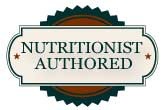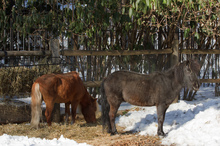
Not all fat is created equal. You may be adding fat to your horse's diet to provide more calories, or to replace starch, but the type of fat can significantly impact your horse's health. Some fats improve immune function, reduce inflammation, and promote healing. Others can have the exact opposite effect. Do you know which is which?

Fat's important role in horse health
The type of fat fed to your horse can significantly impact the horse's health, since some fats improve immune function, reduce inflammation, and promote healing, while others can have the exact opposite effect.
Join Dr. Juliet Getty on Thursday, February 21, for a 90 minute teleseminar on “A Clear View of Fat - Types, Sources, and Benefits.”
The terminology can be confusing. Monounsaturated, omega 3s, DHA, polyunsaturated, rancidity, steroids, phospholipids, eicosanoids, cholesterol, omega 6s, trans fat, hydrogenation: the list is long. What do these terms mean? How do they affect your horse? What fatty sources contain them and which do not?
What's the difference between oils -- is corn oil the same as soybean oil? Is rice bran a good source of fat? Or is coconut oil better? What about how much fat to feed? Do some horses do better on fat? Should fat be avoided for some?
So many questions—and lots of answers. Spend an evening with Dr. Juliet Getty and learn about this somewhat complex topic, in an easy to understand format. You'll be empowered by your new knowledge, better able to read labels and make intelligent choices for your horse.
The teleseminar will emphasize:
- Chemical and structural difference between fatty acids
- Naming fatty acids
- Evaluating oils for their fatty acid content
- Benefits and disadvantages of different fats
- How much fat is required? How much fat is too much?
- Omegas - what are they and what do they do?
- Saturated, monounsaturated, and polyunsaturated fats
- Phospholipids, prostaglandin formation, and steroidal compounds
- Evaluating fat content of brans, seeds, grains, forages, and legumes
- What fats are in that supplement you're feeding? And the feed bag?
- Animal fat for horses
- Coconut oil benefits and drawbacks
- How fat is metabolized in the digestive tract and the cellular level
- Not all equines are the same -- what about your pony, mini, donkey, or mule?
Details:
Date: Thursday, February 21, 2013
Time: 8:00 to 9:30 pm, Eastern Standard Time (7 pm Central; 6 pm Mountain; 5 pm Pacific)
Cost: $15 (your long distance charges may apply); $27 for teleseminar plus audio CD
Register at www.gettyequinenutrition.com . All registrants will be able attend the live event and later listen to and/or download the recording. Registrants receive a confirming email (during business hours) that provides the phone number and conference code for the option to call in for the live event.
The day following the event, registrants receive the website link to the recording, which can be heard through the computer or downloaded to a computer or mp3 player. If the teleseminar date/time is not convenient for any reason, the registrant will still receive access information on how to listen/download the recording.
Dr. Getty will answer questions during the teleseminar; questions and answers are included in the recording. Pre-submitted questions are welcome but they are not necessary, nor is active participation in the seminar; participants may simply listen in. Email specific concerns no later than Thursday morning of the event date to: gettyequinenutrition@gmail.com .
Juliet M. Getty, Ph.D. is an internationally respected equine nutritionist available for private consultations and speaking engagements. Dr. Getty is now a regular contributor to the Horse Journal; her publications also appear in other notable equine media. At www.gettyequinenutrition.com, sign up for her informative—and free—monthly newsletter, Forage for Thought, read articles, search her nutrition forum, enroll in upcoming teleseminars and purchase previously recorded events. Her book, Feed Your Horse Like a Horse, is a comprehensive reference on equine nutrition and is available through Dr. Getty’s website or at Amazon.com. Contact Dr. Getty directly at gettyequinenutrition@gmail.com.
